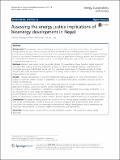Files in this item
Assessing the energy justice implications of bioenergy development in Nepal
Item metadata
| dc.contributor.author | Damgaard, Caroline | |
| dc.contributor.author | McCauley, Darren | |
| dc.contributor.author | Long, Jed | |
| dc.date.accessioned | 2017-03-27T14:30:10Z | |
| dc.date.available | 2017-03-27T14:30:10Z | |
| dc.date.issued | 2017-03-27 | |
| dc.identifier | 249267468 | |
| dc.identifier | 51ba3bb8-78a0-456b-880f-12b18d06c963 | |
| dc.identifier | 85016147533 | |
| dc.identifier | 000411228800001 | |
| dc.identifier.citation | Damgaard , C , McCauley , D & Long , J 2017 , ' Assessing the energy justice implications of bioenergy development in Nepal ' , Energy, Sustainability and Society , vol. 7 , no. 8 , pp. 1-16 . https://doi.org/10.1186/s13705-017-0111-6 | en |
| dc.identifier.issn | 2192-0567 | |
| dc.identifier.uri | https://hdl.handle.net/10023/10530 | |
| dc.description.abstract | Background : The emerging concept of energy justice has focused on the justice implications of conventional energy systems (oil, gas, coal, etc.). Instead, we focus on the meaning of energy justice in the context of unconventional energy systems, by investigating small-scale bioenergy development in Nepal. We approach energy justice as a conceptual framework that focuses on social justice implications of energy systems, with an emphasis on burden/benefit distributions and procedural or post-distributive justice, and consider its applicability beyond conventional energy systems. Methods: Research was carried out in two parallel phases: (1) a quantitative phase, based on spatial analysis of secondary data, explores bioenergy distribution in Nepal, in relation to social-demographic characteristics, to investigate processes of distributive justice, and (2) a qualitative phase, based on thematic analysis of primary interview data, looks at post-distributive aspects of the energy reality in Nepal, to critically discuss the meaning of energy justice in this context. Results : 1) Biogas development is unevenly distributed, following patterns of social connectedness, which suggests significant spatial variation in capabilities or capability deprivations regarding individual agency in relation to (bio)energy. 2) There is a surprising inconsistency in the relationship between socially marginalised populations and attainment of biogas across the country, which needs further research. 3) Individual agency, supported or facilitated by enabling actors—particularly local biogas companies—is a key characteristic of local biogas development. 4) Decentralised, small-scale energy development gives rise to power dynamics differing fundamentally from those of conventional centralised energy systems, through radically different processes of procedural justice. Conclusions: Processes of energy justice are shown to exhibit strong spatial variability and are associated with social connectedness. Analysis focusing on processes of agency and empowerment leads to the conclusion that energy justice, to encourage unconventional energy development, should emphasise the necessary interconnection of individual rights, empowerment and responsibility. | |
| dc.format.extent | 1490304 | |
| dc.language.iso | eng | |
| dc.relation.ispartof | Energy, Sustainability and Society | en |
| dc.subject | Energy justice | en |
| dc.subject | Unconventional energy | en |
| dc.subject | Distributive justice | en |
| dc.subject | Post-distributive justice | en |
| dc.subject | Nepal | en |
| dc.subject | Bioenergy | en |
| dc.subject | GE Environmental Sciences | en |
| dc.subject | H Social Sciences (General) | en |
| dc.subject | NDAS | en |
| dc.subject | SDG 7 - Affordable and Clean Energy | en |
| dc.subject.lcc | GE | en |
| dc.subject.lcc | H1 | en |
| dc.title | Assessing the energy justice implications of bioenergy development in Nepal | en |
| dc.type | Journal article | en |
| dc.contributor.institution | University of St Andrews. Geography & Sustainable Development | en |
| dc.contributor.institution | University of St Andrews. Bell-Edwards Geographic Data Institute | en |
| dc.identifier.doi | https://doi.org/10.1186/s13705-017-0111-6 | |
| dc.description.status | Peer reviewed | en |
This item appears in the following Collection(s)
Items in the St Andrews Research Repository are protected by copyright, with all rights reserved, unless otherwise indicated.

